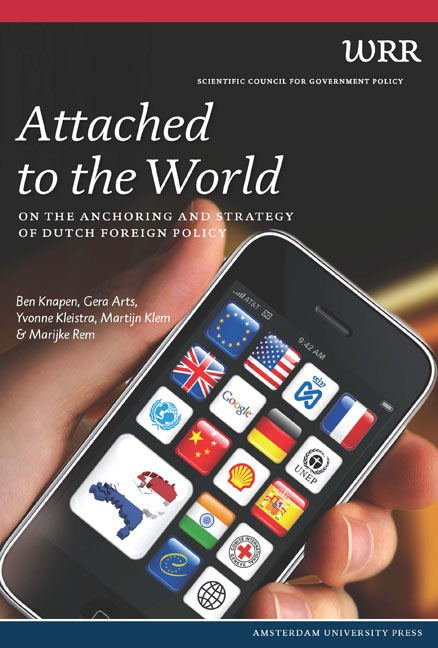Book contents
- Frontmatter
- Contents
- Summary
- Preface
- 1 Motivation and Background: An Introduction
- 2 From Fragmentation to Strategy
- 3 Europe: Arena and Link
- 4 Directing and Facilitating
- 5 Conclusions and Recommendations
- List of Abbreviations
- References
- List of Interviewees
- Appendix 1 The Interrelatedness of the Dutch EconomY
- Appendix 2 The Interrelatedness of the Netherlands With other Nations
- Appendix 3 The Dutch Network of Embassies in a Comparative Perspective
- Appendix 4 Sovereignty in Eu Member States: A Comparison
3 - Europe: Arena and Link
Published online by Cambridge University Press: 19 January 2021
- Frontmatter
- Contents
- Summary
- Preface
- 1 Motivation and Background: An Introduction
- 2 From Fragmentation to Strategy
- 3 Europe: Arena and Link
- 4 Directing and Facilitating
- 5 Conclusions and Recommendations
- List of Abbreviations
- References
- List of Interviewees
- Appendix 1 The Interrelatedness of the Dutch EconomY
- Appendix 2 The Interrelatedness of the Netherlands With other Nations
- Appendix 3 The Dutch Network of Embassies in a Comparative Perspective
- Appendix 4 Sovereignty in Eu Member States: A Comparison
Summary
The awareness that more and more issues are transcending the national level and that cooperation is the only way towards achieving cross-border solutions is an important starting point for successful operation in the field of foreign policy. The Dutch government is thoroughly aware of this fact. As early as in its Re-evaluation Memorandum (Herijkingsnota), it observed that the Netherlands was becoming increasingly more intertwined with the rest of the world, because in an increasingly interdependent world, one's own interests cannot be separated from those of others (TK 1994-1995, 24 337, no. 2: 11). In addition to this awareness of linked destinies and mutual dependency, choosing to cooperate is also founded on the assumption that it will be advantageous for the Netherlands.
The choice we need to make in foreign policymaking and implementation, therefore, has progressed way beyond the question ‘do we or do we not wish to cooperate?’ Since the end of the Cold War, successive Dutch governments have always prioritised cooperation. However, the increasing complexity and dynamics of the international system, have prompted the Netherlands to engage, over the past few years, in cooperation with a growing number of parties on a growing number of issues. Even so, we need to assess which international issues can be meaningfully supported by the Netherlands and in which bodies we should be playing a more pronounced or a more modest role. It is not an option to withdraw from the various partnerships or to remain on the sidelines when called upon to act. It is important to reflect on the instrument of cooperation itself and to establish our ambitions and qualities in these partnerships: to invest in depth rather than in width.
To invest in depth means that it should be accepted across the board that, for the Netherlands, Europe is the most important international arena for taking initiatives and agenda-setting. The architecture of the EU is considered a priority by many, calling for specific attention to be paid to the way the EU is organised and operates, with the following issues ranking high on the national agenda: improving broad-based public support for European integration; securing democratic control and subsidiarity; enforcing admission criteria; and making external policy more coherent (TK 2009-2010, 32 123 V, no. 2). All these issues are about constructive involvement in the wide frameworks in which the European process of integration is developing.
- Type
- Chapter
- Information
- Attached to the WorldOn the Anchoring and Strategy of Dutch Foreign Policy, pp. 59 - 84Publisher: Amsterdam University PressPrint publication year: 2012



